After a government ban, a 1,000-year-old tradition in Vietnam has moved underground.
Trampling through thick vegetation off a remote trail near the southeastern coast of Vietnam, Ba looks back, grinning boyishly, and then dives into a wall of green. All morning, the 36-year-old snake hunter had been taciturn, guarded, but now, under a scorching midday sun in the Mekong Delta, he’s suddenly animated.
As his legs wriggle in the air, Ba digs his hands deep into the foliage, home to vipers, vine snakes, and the infamous king cobras, among other reptiles. He wraps his hands around his slithering quarry and reemerges, ready to bag his catch. Although it’s illegal, sometimes deadly work, catching snakes still provides a living for Ba and others who are willing to risk it.
Ba, who hunts with his wife Lieu, is continuing a tradition dating back a millennium to a village on the outskirts of Hanoi ago when, as the myth goes, a young man saved a princess from a gigantic river serpent by slaying the beast. In Vietnam the snake is equally revered and feared, a virile symbol whose implicit strength ironically led many of its species to be overhunted. The reptile’s meat appears in adventurous dishes; its skin is dried for beer snacks or used for leather; its bile is drunk to supposedly impart that strength. Most famously, the snake’s body is floated in rice wine for months and years, creating ruou thuoc, a fiery liquor believed to boost libido and reverse hair loss.
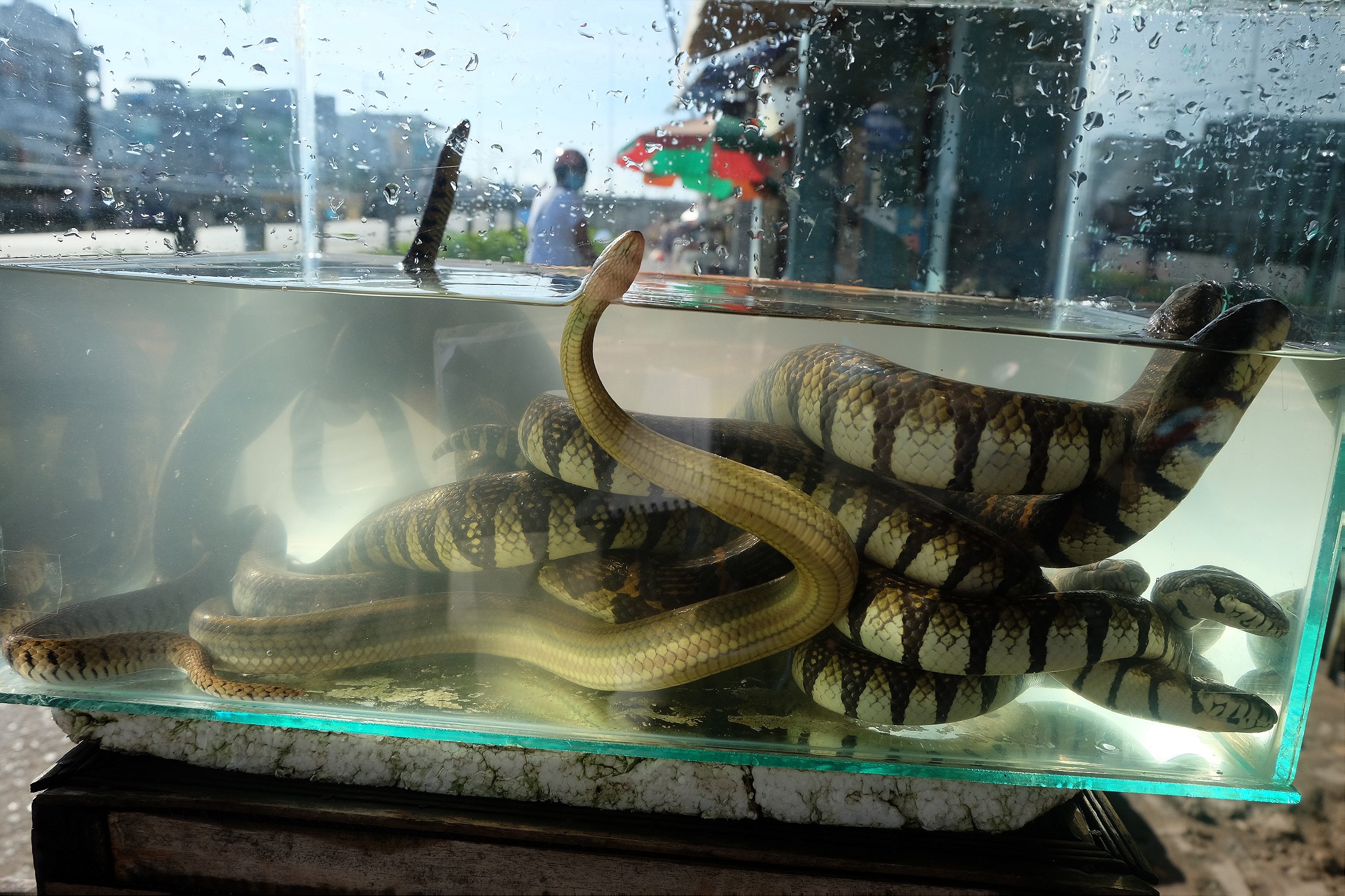
As a result of its popularity, snake populations have plummeted, resulting in a controversial ban on unlicensed hunting and selling. But as locals seek to increase their income after a tough dry season, hunters see the practice making a clandestine comeback, although on a much smaller scale than when the trade was legal. They hide their booty in sacks, making the rounds to small-scale sellers and local restaurants, as well as exporting to China.
This illicit trade persists in Nga Bay, a market town previously renowned for its snake trade. These days, a handful of sellers display rare birds and reptiles underneath a bridge. One of them, Phuong, 42, sits behind three cages filled with snakes, some dead, others heaped on the dead, forming a layer of shifting muscles and scales. (Like all the snake hunters featured in this story, Phuong withheld his full name so as not to be identified by the authorities.) He tells me that he has king cobras bagged in a safe place, which he sells for VND400,000 (US$17) per kilo. He bludgeons them to sell their meat or trades them alive, but he never takes them out of the bags; a bite from the world’s longest venomous snake can kill 20 men.
Phuong laments the dying trade. “Every house [once] sold snakes,” he says. “We didn’t need to hide it, but then the government made a rule to stop us from selling them.”
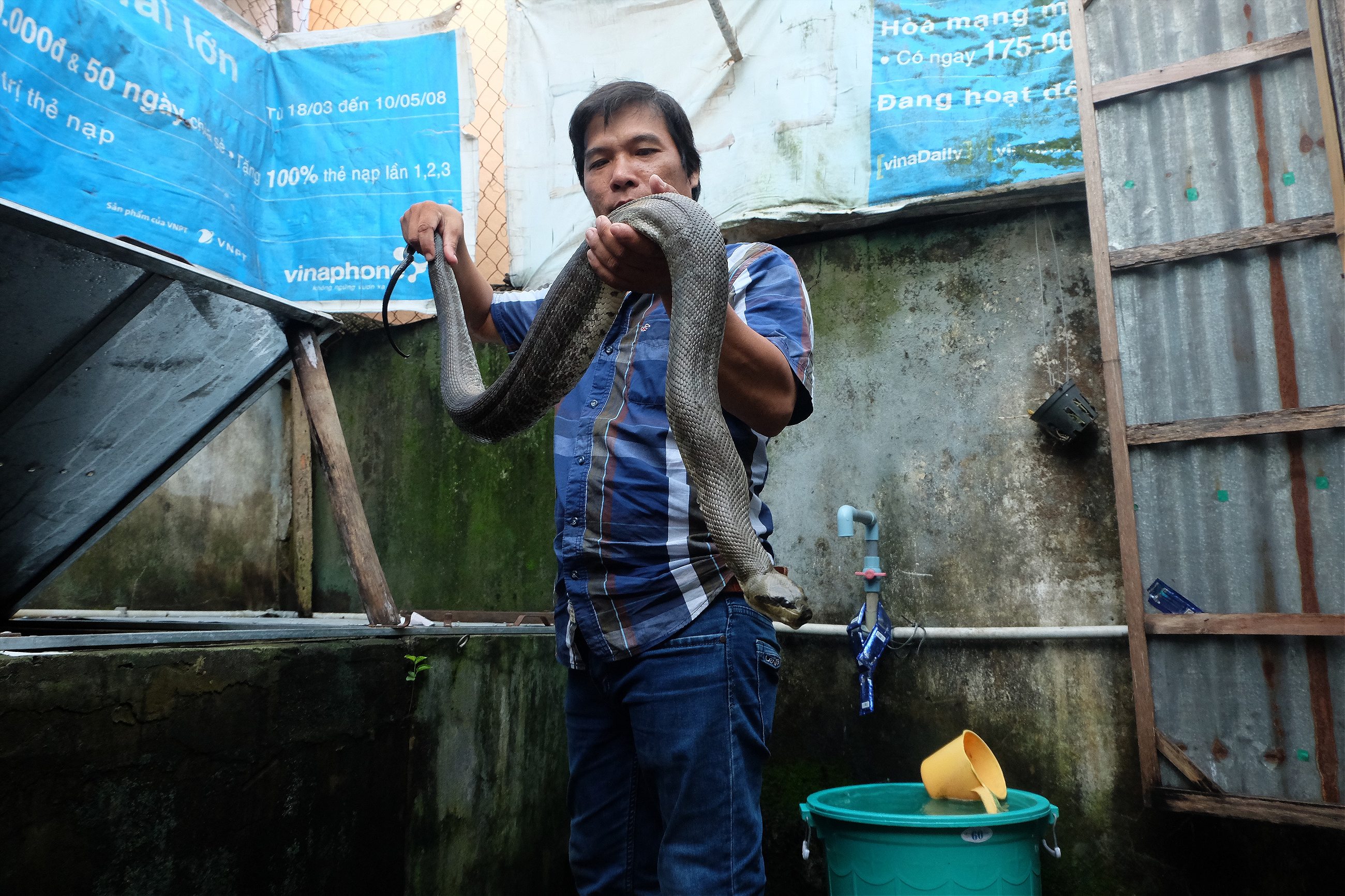
Instead of imposing a blanket ban on hunting and consuming snakes, the government made moves to control the black market by criminalizing hunting without a permit in 1975 and signing the Convention on International Trade in Endangered Species in 1994. Licensed snake farms feed the industry and slow the falling population of endangered species, but the farms’ output fails to satisfy commercial demand, luring farmers towards animals illegally caught in the wild to supplement their captive stock. According to Le Xuan Lam, a manager at Ho Chi Minh City-based charity Wildlife At Risk, animal protection laws are weakly enforced on the ground, with forest protection officers often selling the animals they confiscate back into the illegal trade.
Phuong is surprisingly open about his role in the shady business. He invites me into his living room and says that if I’m looking for snakes, there’s one he can show me in the back of his house. I’m already flanked by thick slabs of skinned python on ice, dripping watery blood into a bowl, and Bocourt’s water snakes desperately wrapping around one another, fighting for oxygen in a crammed tank. Wondering if things could get more grotesque, I follow the man through a dingy, concrete room, passing cobras eerily suspended in jars of rice wine.
I step over a stained mattress, jarringly brushing against a plastic bag I confuse for a snake, and enter a walled-off space out the back. Phuong props up the lid of a container and casually lifts out a sullen puff-faced water snake, priced at VND1.5 million ($67). There are cheaper options, he adds: sunbeam snake for VND100,000 ($4.50) per kilo or rat snake for VND150,000 ($6.70). Through my Vietnamese friend translating for me, I admit to Phuong that I want to meet his suppliers, not buy the reptiles, and after some explaining, a bemused Phuong agrees.
He makes a call before telling us to return at 6 a.m. tomorrow for the snake hunt.
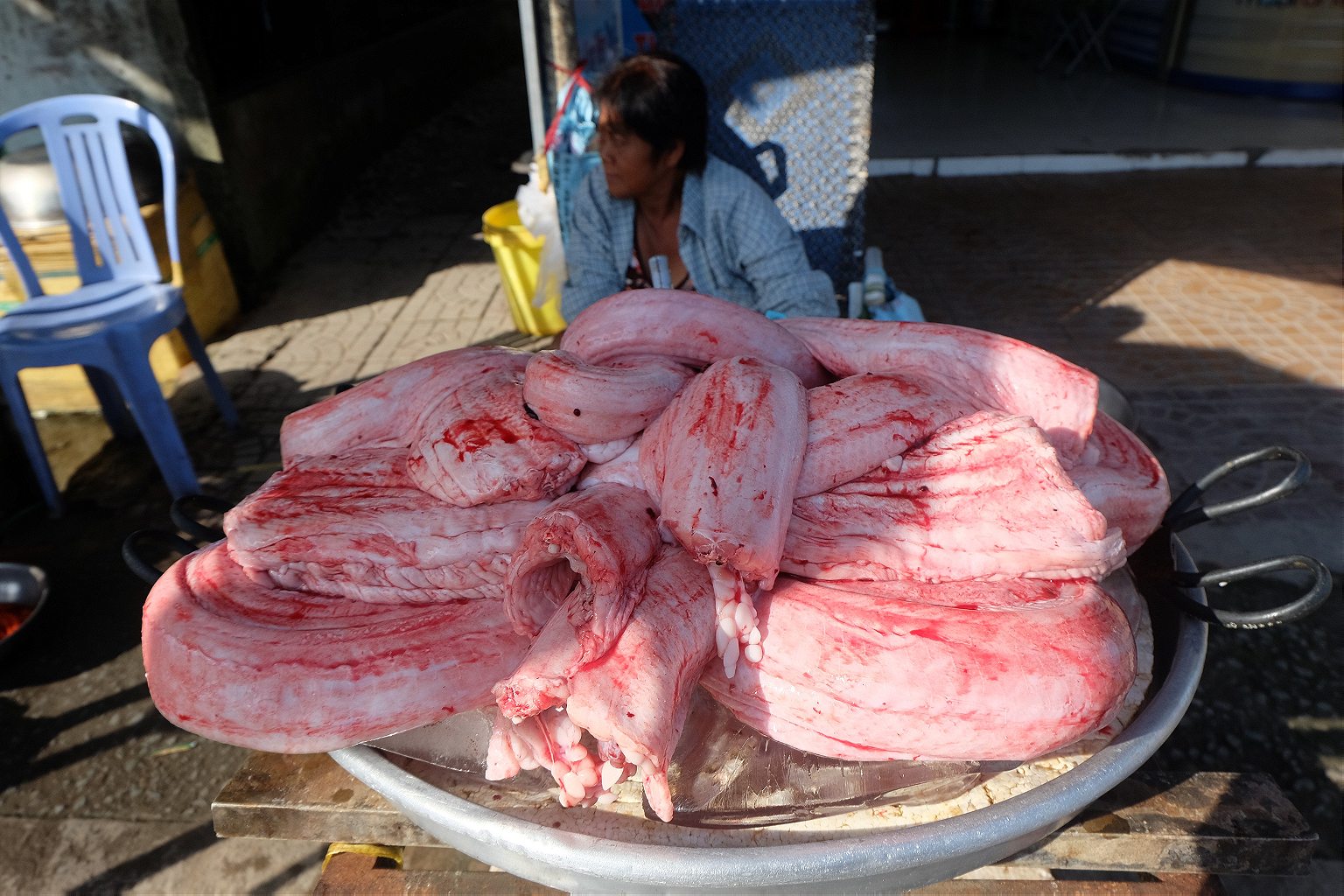
The Mekong Delta region is known among backpackers as the place to go to eat the beating heart of a king cobra. An American traveler recently showed me a video of himself and two locals near Can Tho, the delta’s largest city. One man gripped a writhing king cobra and another dug a knife just underneath its head, ripping out its heart, which the American washed down with a shot of the cobra’s blood. He paid $150 for the privilege—a figure only $11 short of the average monthly salary in the region. Even during good times this windfall would tempt people to risk catching deadly snakes, but this year has been exceptionally hard for all 13 provinces in the delta.
Cuu Long, the Mekong’s Vietnamese name, is recovering from its worst drought since records began in 1926. Scientists have cited El Nino, the weather cycle that causes scorching temperatures and reduced rainfall, as the main reason for widespread crop damage. Other reasons, such as the construction of hydropower dams upstream in Cambodia, Laos, and China, ensured there was not enough fresh water in the river to dilute the seawater, meaning further crop failures.
Now we’re back into wet season—snake season—and as the rains return to Vietnam’s rice bowl, people are keen to take advantage of the good times.
The next morning I meet the husband-and-wife snake hunters, Ba and Lieu, who warily note an increase in competitors in the past couple of years. “Many people do this job now,” says Lieu, 34, as she straps on her helmet, ‘ROCK STAR’ stickered across its back. “But the profit is good for people who sell snakes, not really for people who do snake hunting. Buying and selling can be stressful but that is easier than hunting since they don’t have to be soaked by the sun and the rain. Hunting snakes is a miserable job.”
The mouse dealer offers me one of the four-month-old Burmese pythons.
Ba pulls the throttle, setting a pace far beyond my driving skills, and, when I catch up, points across the highway to our first stop—a mouse dealer—before we head to Soc Trang Province, 45 miles away.
Off his bike, Ba touches the wiry hair spouting from his lucky mole, lights up his sixth cigarette of the morning, and then throws mice from the shop’s big cage into his own small cage. They buy 200 mice a time at around 15 cents each, and place a mouse along with some food pellets in each of the 100 traps laid every three days, selling the rest of the mice to a farm on the way. In the best months, says Ba, they catch 60 snakes from their traps, although its usually between 20 and 30. The mouse dealer offers me one of the four-month-old Burmese pythons caged next to the mice for $17. I decline; they’re destined for exotic dishes, wallets, shoes, bags, and belts.
Our route to the next stop takes us through riparian countryside on narrow, potholed lanes-cum-rice paddy borders, with not a policeman in sight, just as the hunters hoped. “This is a snake village,” Lieu declares on arriving at the farm. “All of this village collects the snakes together; the atmosphere is very happy.” She strolls across the dirt towards a pile of rudimentary mesh wire traps, which allow the snake to enter through two angled doors but make it impossible to leave.
Lieu made the daunting leap from vegetable seller to snake hunter 10 years ago and recalls having consistently swollen fingers when she first learned how to make traps. They managed to catch snakes, however, after paying other hunters to teach them the tricks of the trade, such as how to follow the paths of the snakes. The couple works almost every day of the week, earning about $157 a month to look after their seven-year-old daughter and Lieu’s mother. It’s a tough life: other hunters often steal traps, which cost about $3 each, and the mice are often difficult to find, but their lack of other income sources forces them to persevere.
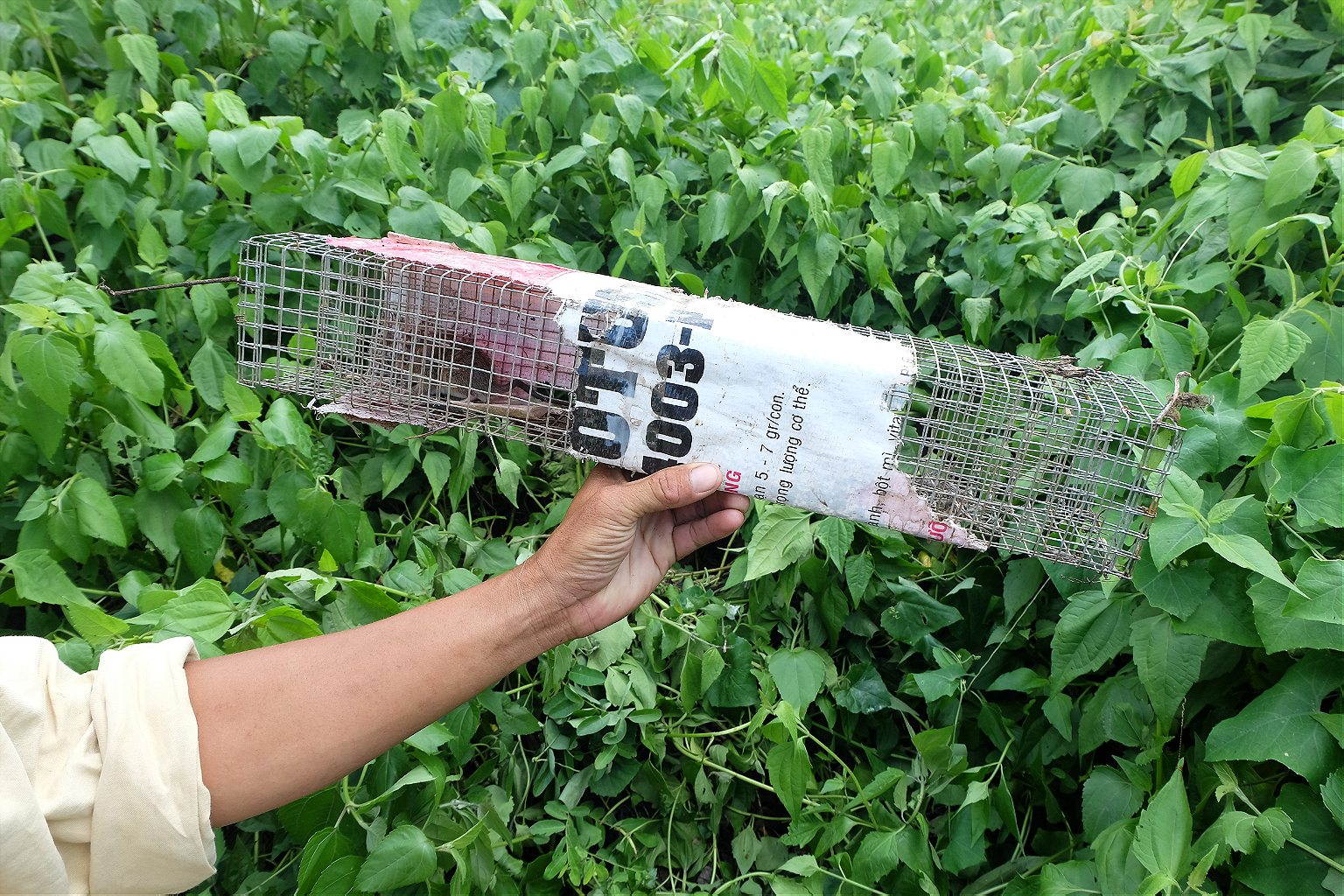
After driving for another hour, we arrive at the thick vegetation. Ba reemerges with a trap. No snakes. He burrows deeper in the foliage until he clasps the next snare, shaking it until a sunbeam snake falls into his sack. He began weighing snakes for his brother at the age of 19 but held off hunting after the brother was bitten on his forearm while trying to catch a king cobra. In severe pain, barely able to breathe or move, he received treatment just in time and survived. Ba prays on the second and sixteenth of every month as well as before every trap collection in the hope that the same doesn’t happen to him or his wife.
As he inspects the next, Lieu calls over from the shade.
“You know, no one in my husband’s family accepts me,” she says. “They’re very rich and mine is the opposite. They don’t accept a poor bride.” Lieu comes from a family of fortune-tellers who believe her work is ominous in every way imaginable. They’re also extremely poor, and because Ba’s disapproving family didn’t give the couple any wedding gifts, they began married life “empty handed,” she says. Snake hunting appeared to be the couple’s only fruitful option. “Because of these challenges, we love each other so much. People ask us how we can love this much after our families denied our wedding. I don’t know how to answer this question, but I see it’s our fate to be with each other.”
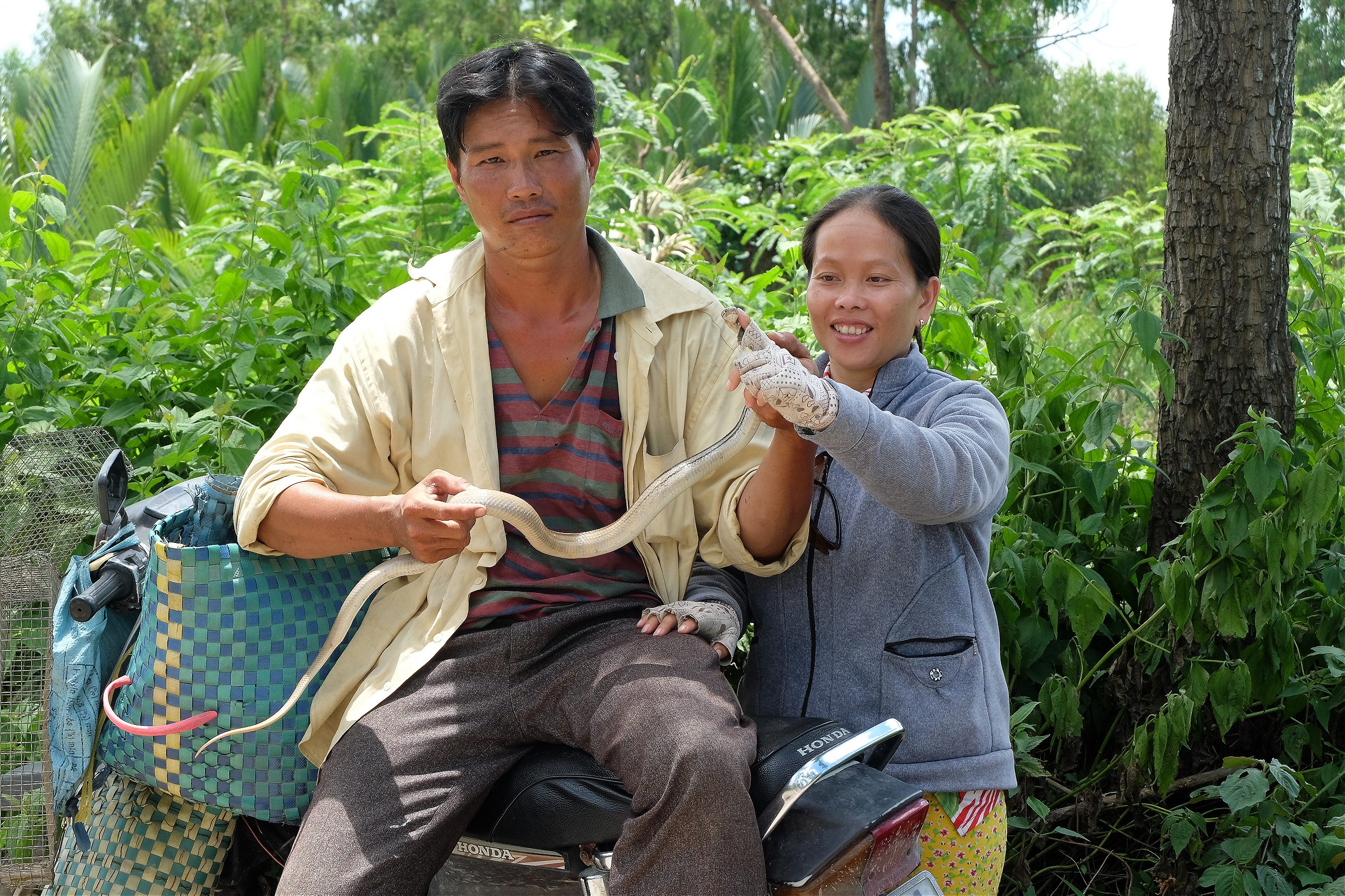
Ba returns with the snakes, eager to sell them today to reduce the risk of getting caught red-handed by authorities. With pressure from media and charities, the government is likely to tighten the ban in the future, although this may make snake catching even more lucrative and tempting. Ba’s already seen a rise in hunters and he dislikes it as much as he dislikes hunting itself.
“Sometimes we work till midnight,” he says. “In rainy days we have to swim in the rivers to hunt the snakes. We would want to change our job if we had a chance… I want to work in the shade.”
Lieu grabs the sack, the bundle of snakes bouncing off her lap as they drive away.